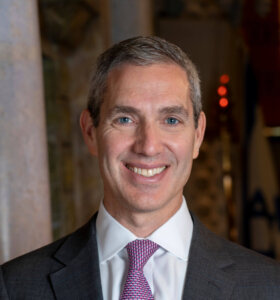An older woman raises a fist in solidarity while holding a sign that reads “Armed Resistance Is The Strategic Choice Free Palestine” during a Nakba Day protest in Bay Ridge, Brooklyn, on May 10. Photo by Madison Swart / Hans Lucas / Hans Lucas via AFP/Getty Images
A few weeks ago, I attended my daughter’s college graduation. I was filled with pride. But as the ceremonies unfolded, I was also unsettled.
It wasn’t because of the ubiquitous presence of Palestinian flags, keffiyehs and divestment leaflets. They may not be my cup of tea, but as a defender of free speech, I understand — and affirm — the right of those students to express their politics and point of view.
It was because of one phrase that accompanied them: “Free Palestine.”
Also ubiquitous since Oct. 7 and the onslaught of the Israel-Hamas war, the phrase has taken on new meaning since it was shouted by the man who murdered Yaron Lischinsky and Sarah Milgrim outside the Capital Jewish Museum just days before my daughter’s graduation. Two beautiful young souls in their prime, gunned down in cold blood in an antisemitic hate crime of the highest order.
The couple had not yet even been buried. And yet on the caps, gowns and stoles of a parade of students, the refrain of their killer stared me straight in the face. The pain of being confronted, over and over, with the slogan that he clearly believed justified his inhumane and bigoted act was immense.
Just one week later, that pain gained a new dimension, after a man attacked a peaceful Boulder, Colorado vigil for the hostages still held by Hamas with Molotov cocktails while shouting “Free Palestine.” Twelve were injured, including an 88-year-old Holocaust survivor.
In light of these recent events, it’s time for us to be honest about the fact that the slogan “Free Palestine” can no longer be understood merely as championing Palestinian self-determination, but also as a signal calling for violence against Jews. Its usage should be condemned in civil discourse, and avoided by all.
I know that, for many who call for a “free Palestine,” the words are only a symbol of a deeply held human rights ideal — nothing more. But after the attacks in D.C. and Boulder were both marked by use of the same term, I fear few Jews will be able to hear it without worrying that violence might follow.
Civil debate about Israel’s war against Hamas in Gaza, its horrific human cost, and the best way to secure the release of the remaining hostages is both kosher and necessary. The same is true about the U.S. government’s current policies toward the Middle East, the university system, and immigration.
But people who care passionately about these issues must acknowledge that the meaning of language can easily change. The slogan “free Palestine” is undergoing such a change,, because of its repeated use as Jewish blood has been threatened and spilled, and because those antisemitic acts have found justification and lionization online after the fact; one pro-Palestinian TikToker with 3.4 million followers said, of the D.C. shooter, “He is not a terrorist. He’s a resistance fighter.” In too many spaces, “free Palestine” has come to be a call for an end to the Jewish state, and a justification of violence against Jews no matter where they live.
I know some will respond by saying there are many Jews among the ranks of pro-Palestinian protesters, many of whom have embraced the language of “free Palestine.” They should be leading the charge in retiring this language, since they — more than other protesters — should understand that putting Jews on the defensive with language that now feels threatening will not help achieve the movement’s goals. For a Jew to brandish the slogans of those who would do harm to other Jews is a form of moral self-immolation that serves to provide cover to those who seek our destruction.
Language is not fixed; it carries the history of its usage. To those who argue we must distinguish between the rhetoric of a few bad actors and the intent of the many, and thus give people the benefit of the doubt, I offer a reminder of the senseless murder of Yaron Lischinsky and Sarah Milgrim.
Their murderer didn’t give them the benefit of the doubt. Why are our feelings — our grief, our fear — worth less?
The same progressive instincts that are quick to condemn the slightest verbal foot fault as a microaggression when it comes to most minority communities are absent, it seems, when Jewish lives are at risk. To me, that hypocrisy reeks of antisemitism.
In a world of trigger warnings and land acknowledgments, in which we’re more conscious of the ability of language to do harm than ever before, surely there is a way to express dissent from Israeli policy, and empathy for the Palestinian people, without repeating slogans that Jewish people now associate with profound traumas.
Antisemitism is the oldest hatred. But like a virus, it mutates with every generation. Today, its most recent form often comes dressed in the language of anti-Zionism. We must have the courage to name it for what it is — and to stand against it with clarity, conviction and strength.

